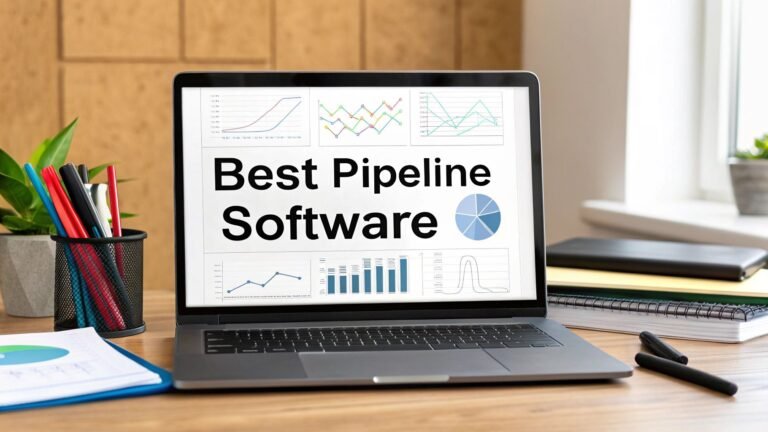Managing a sales pipeline without the right tools can feel like trying to direct traffic with a blindfold. Deals fall through the cracks, follow-ups are missed, and forecasting becomes a guessing game. Effective sales pipeline management software brings clarity and control, transforming a chaotic process into a predictable revenue engine. It provides a visual, real-time overview of every deal, from the first contact to the final signature.
This guide is built to help you find the perfect platform for your specific needs, whether you're a small startup or a large enterprise. We've gone beyond the marketing copy to provide a detailed breakdown of the top 12 solutions available today. You'll find a practical analysis of each tool's core features, pricing structures, and real-world pros and cons.
For each option, we've included screenshots to give you a feel for the user interface and direct links to get started. Our goal is to cut through the noise and give you a clear, straightforward comparison. This resource will help you select the sales pipeline management software that will streamline your workflow, empower your team, and ultimately, help you close more deals. Let's dive into the options.
1. Salesforce Sales Cloud
Salesforce Sales Cloud is an enterprise-grade CRM that offers some of the most powerful sales pipeline management software available. It’s designed for teams that require deep customization and scalability to manage complex sales cycles. Users can visually track opportunities through every stage, create detailed forecasts, and automate repetitive tasks to keep reps focused on selling.
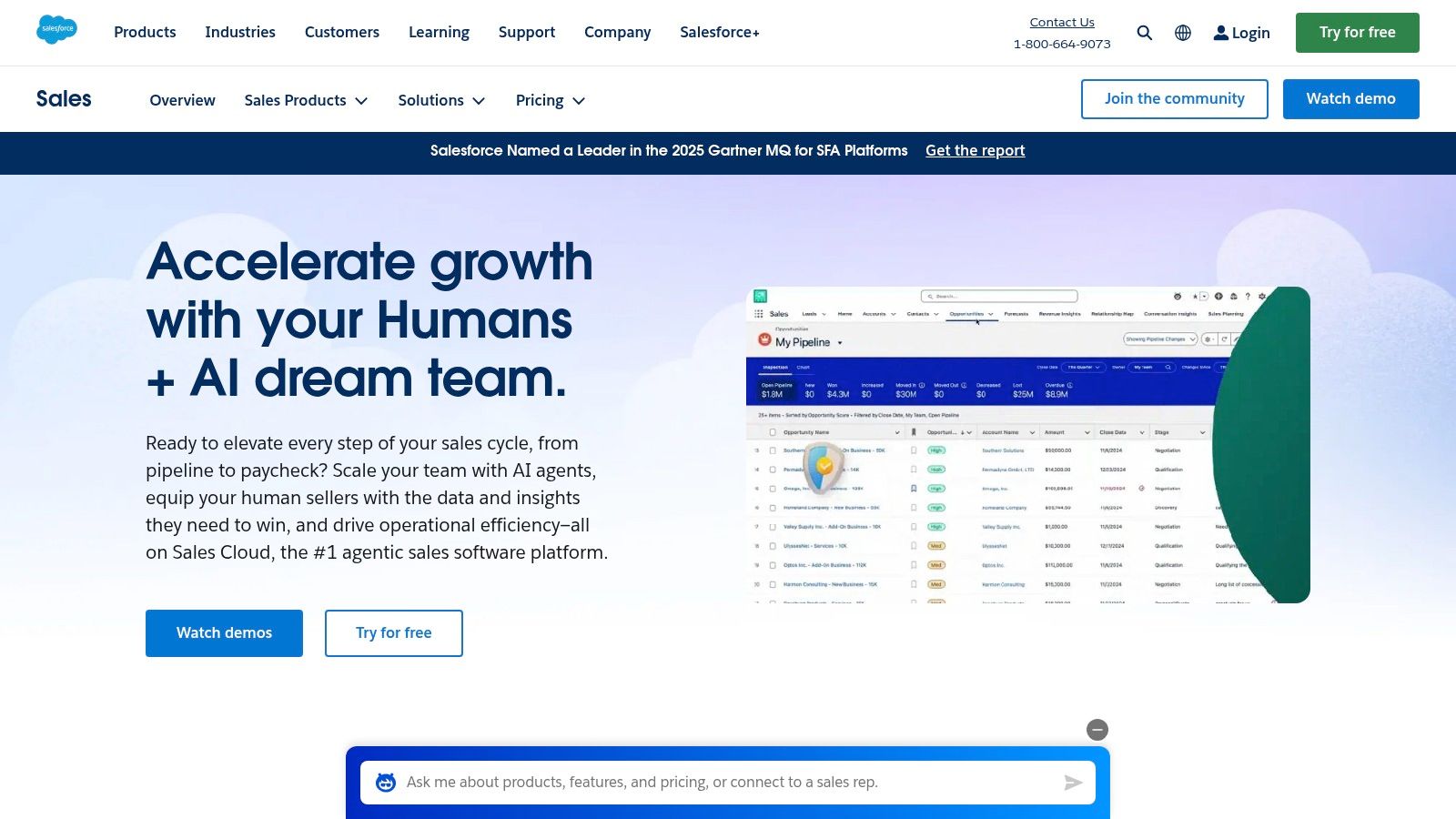
What makes Salesforce stand out is its vast ecosystem. Beyond its core features like advanced reporting and AI add-ons, the AppExchange marketplace allows you to integrate thousands of third-party apps, extending its functionality to fit nearly any business need.
Key Details & Pricing
| Aspect | Detail |
|---|---|
| Ideal For | Medium to large enterprises with complex sales processes. |
| Pricing | Plans start at $25/user/month (billed annually) for the Starter Suite. |
| Unique Feature | The massive AppExchange ecosystem for endless customization. |
| Implementation | Requires dedicated administrative expertise and a longer setup time. |
Pros:
- Extensive customization to match intricate sales workflows.
- Highly scalable, growing with your business from startup to enterprise.
- Massive marketplace and third-party service ecosystem.
Cons:
- Can be expensive, with costs increasing with add-ons and higher tiers.
- Steep learning curve and often requires a dedicated administrator.
Website: https://www.salesforce.com/sales/
2. HubSpot Sales Hub
HubSpot Sales Hub is a powerful, pipeline-centric sales platform built upon HubSpot’s free CRM, making it a top choice for small to medium-sized businesses. Its intuitive design simplifies the management of deal stages, sales activities, and contact records. This sales pipeline management software excels at automating outreach with features like email sequences and provides AI-powered tools for forecasting and conversation intelligence.
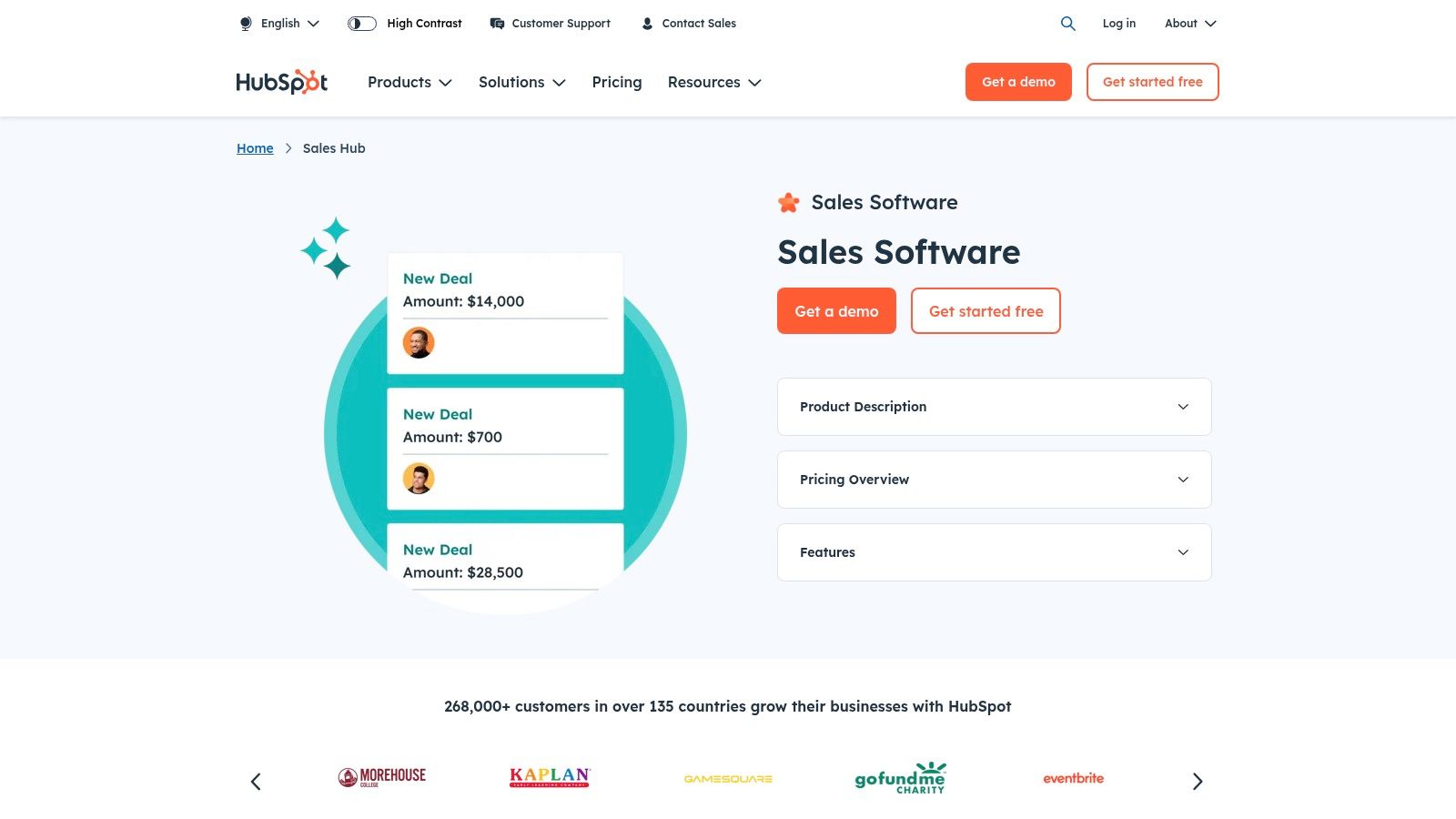
What makes HubSpot stand out is its seamless integration with its own marketing and service hubs, creating a unified view of the entire customer journey. The platform's ease of use and extensive free educational resources, like HubSpot Academy, ensure teams can get up and running quickly. While its sales features are robust, its integration capabilities make it a strong contender in broader marketing discussions, as highlighted in this email marketing platform comparison.
Key Details & Pricing
| Aspect | Detail |
|---|---|
| Ideal For | SMBs and scaling teams that prioritize ease of use and an all-in-one platform. |
| Pricing | Plans start at $15/user/month (billed annually) for the Sales Hub Starter. |
| Unique Feature | A powerful free CRM foundation with tightly integrated marketing and service tools. |
| Implementation | Quick and straightforward onboarding, especially for lower-tier plans. |
Pros:
- Excellent free tier and a user-friendly interface that speeds up adoption.
- Strong educational resources and a supportive community.
- Seamless native integration with HubSpot's Marketing and Service Hubs.
Cons:
- Costs can increase significantly as you add more users and advanced features.
- A mandatory onboarding fee is required for the Enterprise tier.
Website: https://www.hubspot.com/products/sales
3. Pipedrive
Pipedrive is a sales-focused CRM celebrated for its intuitive and highly visual approach to sales pipeline management software. Built around a Kanban-style drag-and-drop interface, it allows sales teams to see exactly where every deal stands at a glance. Its design philosophy prioritizes ease of use and quick adoption, making it a favorite among small and medium-sized businesses looking for immediate value.
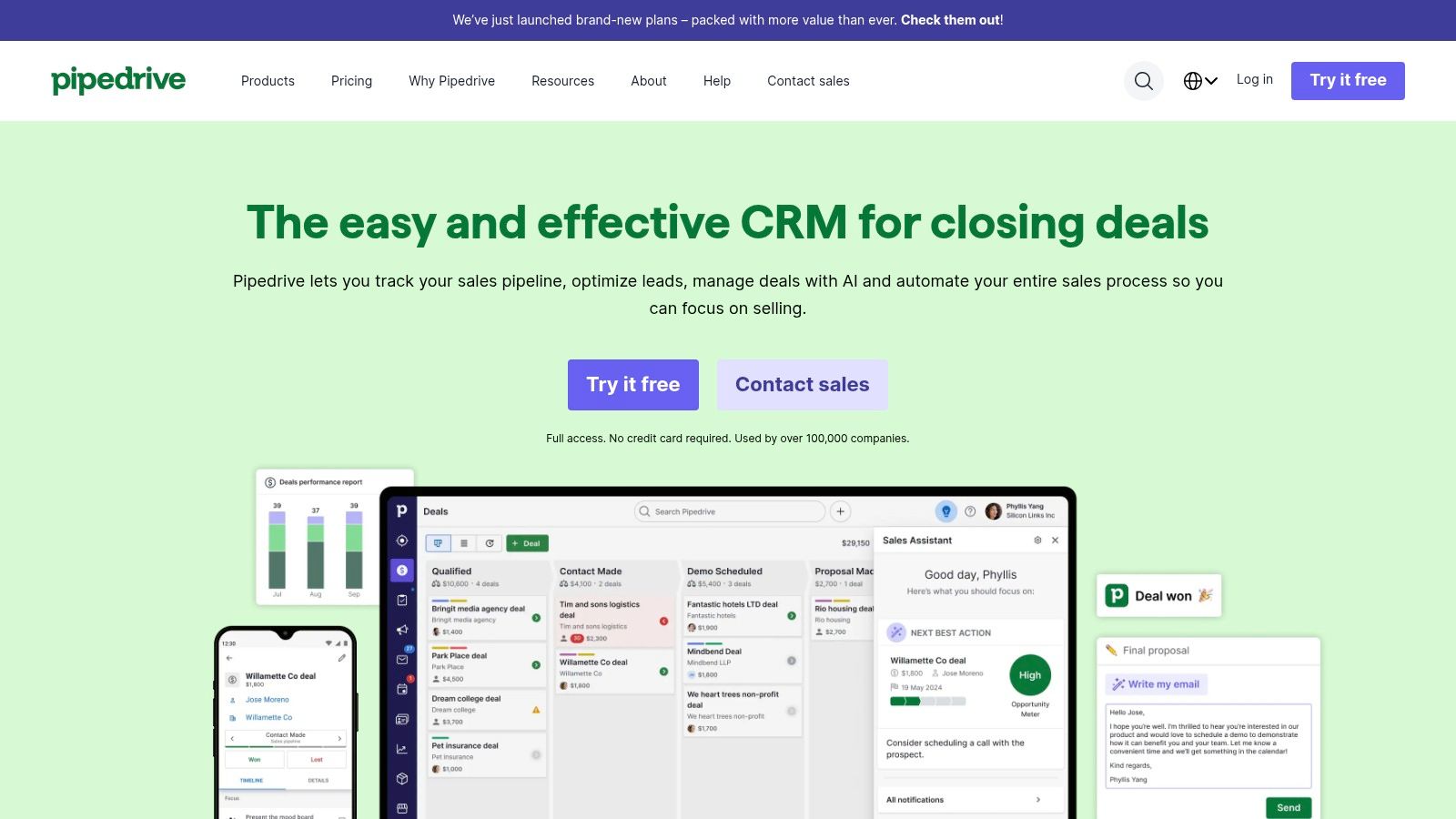
What makes Pipedrive stand out is its relentless focus on the sales process itself. Instead of overwhelming users with features unrelated to closing deals, it provides essential tools like email synchronization, activity reminders, and workflow automations that directly support sales rep productivity. With over 500 integrations, it easily connects to the tools your team already uses.
Key Details & Pricing
| Aspect | Detail |
|---|---|
| Ideal For | Small to medium-sized businesses needing a simple, visual sales pipeline. |
| Pricing | Plans start at $14.90/user/month (billed annually) for the Essential plan. |
| Unique Feature | The activity-based selling methodology embedded in its user interface. |
| Implementation | Very fast setup, often getting teams operational within a day. |
Pros:
- Extremely intuitive and visual interface requires minimal training.
- Transparent and affordable pricing with a 14-day free trial.
- Strong focus on activities that directly drive sales forward.
Cons:
- No free-forever plan is available for very small teams or solo users.
- Advanced marketing and lead generation features require paid add-ons.
Website: https://www.pipedrive.com/
4. Zoho CRM
Zoho CRM is a highly cost-effective platform that delivers powerful sales pipeline management software without the enterprise-level price tag. It's an excellent choice for SMBs seeking a single system that can handle sales, marketing, and support. The platform allows for the creation of multiple pipelines, each with unique stages and workflow automations, making it adaptable to different products or sales cycles.
What sets Zoho apart is its incredible value and deep integration within its own ecosystem. Features like its Blueprint automation tool guide reps through sales processes, while the Zia AI assistant offers predictions and suggestions to improve pipeline velocity. For businesses already using other Zoho products, the seamless connectivity creates a unified and powerful operational hub.
Key Details & Pricing
| Aspect | Detail |
|---|---|
| Ideal For | SMBs and mid-market companies needing an affordable, all-in-one CRM. |
| Pricing | Plans start at $14/user/month (billed annually) for the Standard plan. |
| Unique Feature | Blueprint, a visual process automation tool to enforce best practices. |
| Implementation | Fairly intuitive, though exploring its full feature set takes time. |
Pros:
- Extremely competitive pricing for a robust set of features.
- Flexible customization and powerful automation capabilities.
- Seamless integration with the extensive Zoho business suite.
Cons:
- The user interface can feel complex and overwhelming for new users.
- Advanced analytics and reporting are reserved for higher-priced tiers.
Website: https://www.zoho.com/crm/
5. Microsoft Dynamics 365 Sales
Microsoft Dynamics 365 Sales is an enterprise-level CRM that offers robust sales pipeline management software for organizations deeply embedded in the Microsoft ecosystem. It seamlessly integrates with tools like Outlook, Teams, and Power BI, allowing teams to manage leads and opportunities directly within their daily workflows. The platform uses AI-powered assistants to guide sellers toward their next best action and provides advanced forecasting capabilities.
What makes Dynamics 365 Sales stand out is its native connection to LinkedIn Sales Navigator, which provides rich contextual data for prospecting and relationship building. This integration helps teams identify key decision-makers and understand their buyers better, which is crucial for turning marketing qualified leads into sales. Its strong security and compliance standards also make it a trusted choice for large enterprises.
Key Details & Pricing
| Aspect | Detail |
|---|---|
| Ideal For | Enterprises already using the Microsoft 365 suite. |
| Pricing | Plans start at $65/user/month for the Sales Professional license. |
| Unique Feature | Deep, native integration with Microsoft 365 and LinkedIn Sales Navigator. |
| Implementation | Typically requires significant setup and configuration effort. |
Pros:
- Seamless integration with Microsoft products like Teams and Outlook.
- Strong security and compliance standards ideal for enterprises.
- Powerful AI and conversation intelligence features.
Cons:
- Licensing can be complex and expensive.
- Implementation can be resource-intensive and requires expertise.
Website: https://www.microsoft.com/dynamics-365/sales
6. monday sales CRM
monday sales CRM reimagines sales pipeline management software with a highly visual, board-based interface that emphasizes flexibility and team collaboration. Built on the popular monday.com Work OS, it allows sales teams to manage unlimited pipelines, track leads, and automate routine tasks in a colorful, intuitive environment. Its drag-and-drop functionality makes customizing workflows simple for any user, regardless of technical skill.
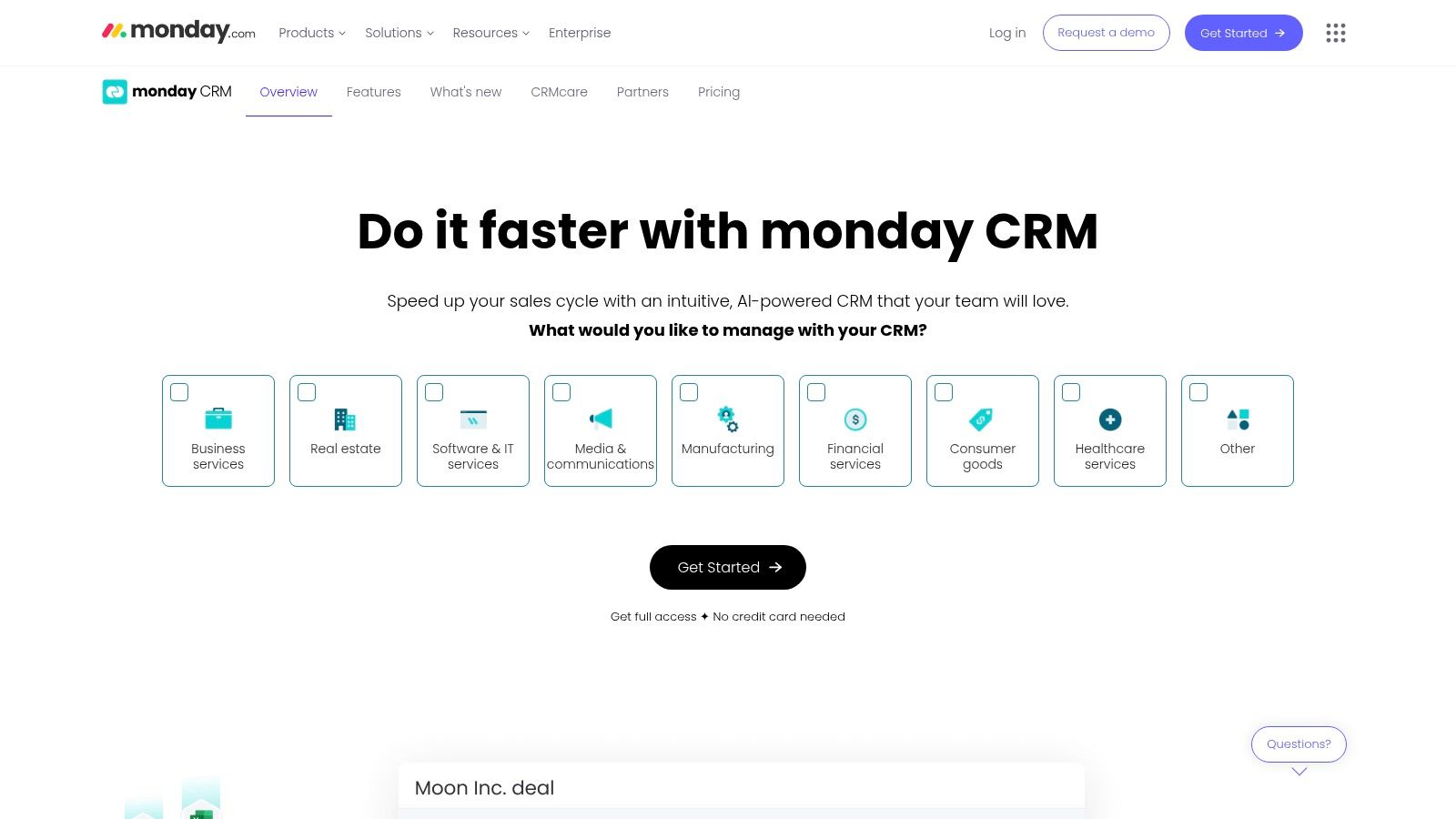
What sets monday sales CRM apart is its seamless integration with other business functions. Because it’s part of a broader work management platform, sales activities can be directly linked to marketing campaigns, project management boards, and client onboarding processes, creating a unified operational hub that breaks down departmental silos.
Key Details & Pricing
| Aspect | Detail |
|---|---|
| Ideal For | Teams of any size looking for a flexible, collaborative CRM. |
| Pricing | Plans start at $10/seat/month (billed annually) with a 3-seat minimum. |
| Unique Feature | A unified platform that connects sales with marketing and operations. |
| Implementation | Very intuitive and fast to set up, with no coding required. |
Pros:
- Highly customizable and visual interface that is easy to adopt.
- Excellent for cross-functional collaboration between departments.
- Strong workflow automation capabilities simplify repetitive tasks.
Cons:
- Some advanced CRM features like quoting are only in higher-priced tiers.
- The per-seat pricing with a user minimum can be costly for very small teams.
Website: https://monday.com/crm/
7. Freshsales
Freshsales by Freshworks offers a unified platform that combines CRM capabilities with built-in communication tools, making it a strong choice for small to mid-sized businesses. This sales pipeline management software integrates telephony, email, and chat directly into the interface, giving teams a complete view of every customer interaction. Users can manage deals across multiple pipelines, automate sales sequences, and gain insights with AI-driven scoring.
What makes Freshsales stand out is its all-in-one approach at a competitive price point. It eliminates the need for multiple third-party communication tools by providing everything reps need in one place, from making calls to tracking email opens. This creates a streamlined workflow that helps sales teams close deals faster without juggling different applications.
Key Details & Pricing
| Aspect | Detail |
|---|---|
| Ideal For | SMBs and mid-market companies wanting an all-in-one sales and communication tool. |
| Pricing | Offers a free plan for up to 3 users. Paid plans start at $15/user/month (billed annually). |
| Unique Feature | Built-in phone, email, chat, and SMS capabilities within the CRM. |
| Implementation | Generally straightforward with an intuitive user interface and a 21-day free trial. |
Pros:
- All-in-one communication and CRM platform simplifies the sales stack.
- Competitive pricing provides excellent value for growing teams.
- Intuitive interface and easy setup process.
Cons:
- Advanced AI and forecasting features are locked behind higher-tier plans.
- Customization options are less extensive compared to enterprise-level CRMs.
Website: https://www.freshworks.com/crm/
8. Copper
Copper is the CRM built directly into Google Workspace, making it a powerful choice for teams that live inside Gmail and Google Calendar. Its approach to sales pipeline management software is centered on seamless integration, eliminating data entry by automatically syncing contacts, emails, and meetings. This creates a clean, visual pipeline that requires minimal administrative effort to maintain.

What makes Copper stand out is its native experience. It functions like a natural extension of your inbox, with a Chrome extension that enriches contact data and surfaces deal information right where you work. For US-based teams heavily reliant on Google's suite, this deep integration streamlines workflows and boosts adoption significantly.
Key Details & Pricing
| Aspect | Detail |
|---|---|
| Ideal For | Small to medium-sized businesses and agencies deeply integrated with Google Workspace. |
| Pricing | Plans start at $23/user/month (billed annually) for the Basic tier. |
| Unique Feature | Native integration with Google Workspace, operating seamlessly within Gmail. |
| Implementation | Very fast and straightforward, with virtually no learning curve for Google users. |
Pros:
- Extremely easy to use for Google-centric teams.
- Low administrative overhead and fast deployment.
- Automates contact and activity logging from Gmail.
Cons:
- Lower tiers have significant contact limits.
- Fewer enterprise-grade features compared to large CRMs.
Website: https://www.copper.com/
9. Close
Close is a high-velocity sales CRM designed for inside sales teams that live on the phone and in their inbox. It consolidates calling, SMS, and email into a single, unified interface, making it a powerful piece of sales pipeline management software for teams focused on high-volume outreach. Reps can manage multiple pipelines, automate follow-ups, and leverage a predictive dialer to maximize their efficiency.
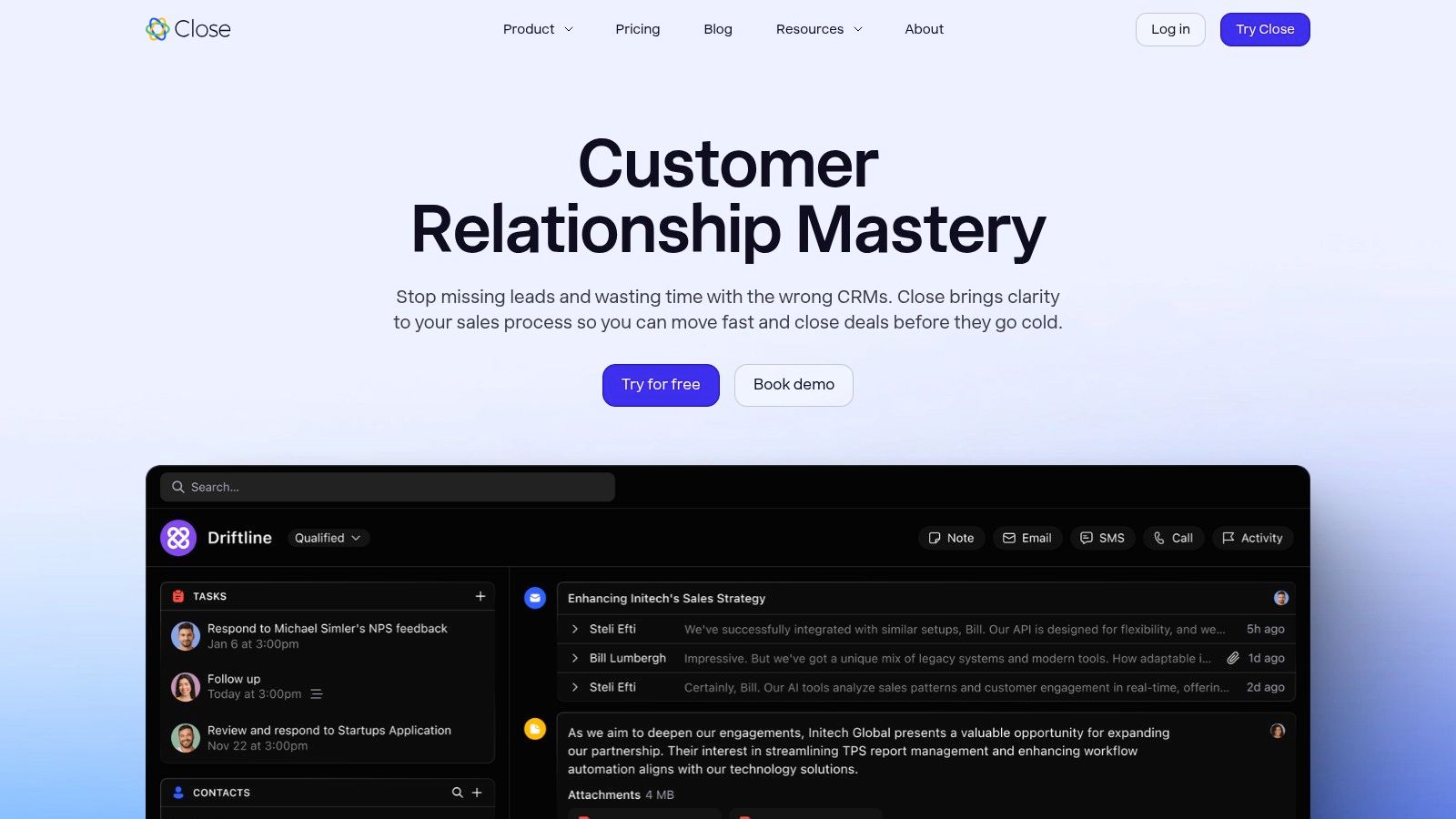
What makes Close stand out is its ruthless focus on communication. Instead of switching between tabs and tools, all interactions are logged and managed within the contact's timeline, giving sales reps complete context without ever leaving the platform. This streamlined workflow is ideal for teams that need to make hundreds of calls and send thousands of emails weekly.
Key Details & Pricing
| Aspect | Detail |
|---|---|
| Ideal For | Inside sales teams, SMBs, and startups focused on high-volume sales. |
| Pricing | Plans start at $29/user/month (billed annually) for the Starter plan. |
| Unique Feature | All-in-one communication hub with built-in calling, SMS, and email. |
| Implementation | Quick and straightforward setup designed for immediate use. |
Pros:
- Excellent integrated communication tools streamline workflows.
- Purpose-built for outbound and high-velocity sales teams.
- Intuitive interface with a minimal learning curve.
Cons:
- Telephony and SMS usage result in additional costs.
- Lacks the extensive enterprise features and governance of larger CRMs.
Website: https://www.close.com/
10. Insightly
Insightly is a unified CRM platform that uniquely combines its sales pipeline management software with native project management. This integration is designed for businesses whose sales cycle doesn't end when a deal is won but continues into implementation or service delivery. Users can convert won opportunities directly into projects, ensuring a smooth handover from sales to the delivery team without losing critical context.
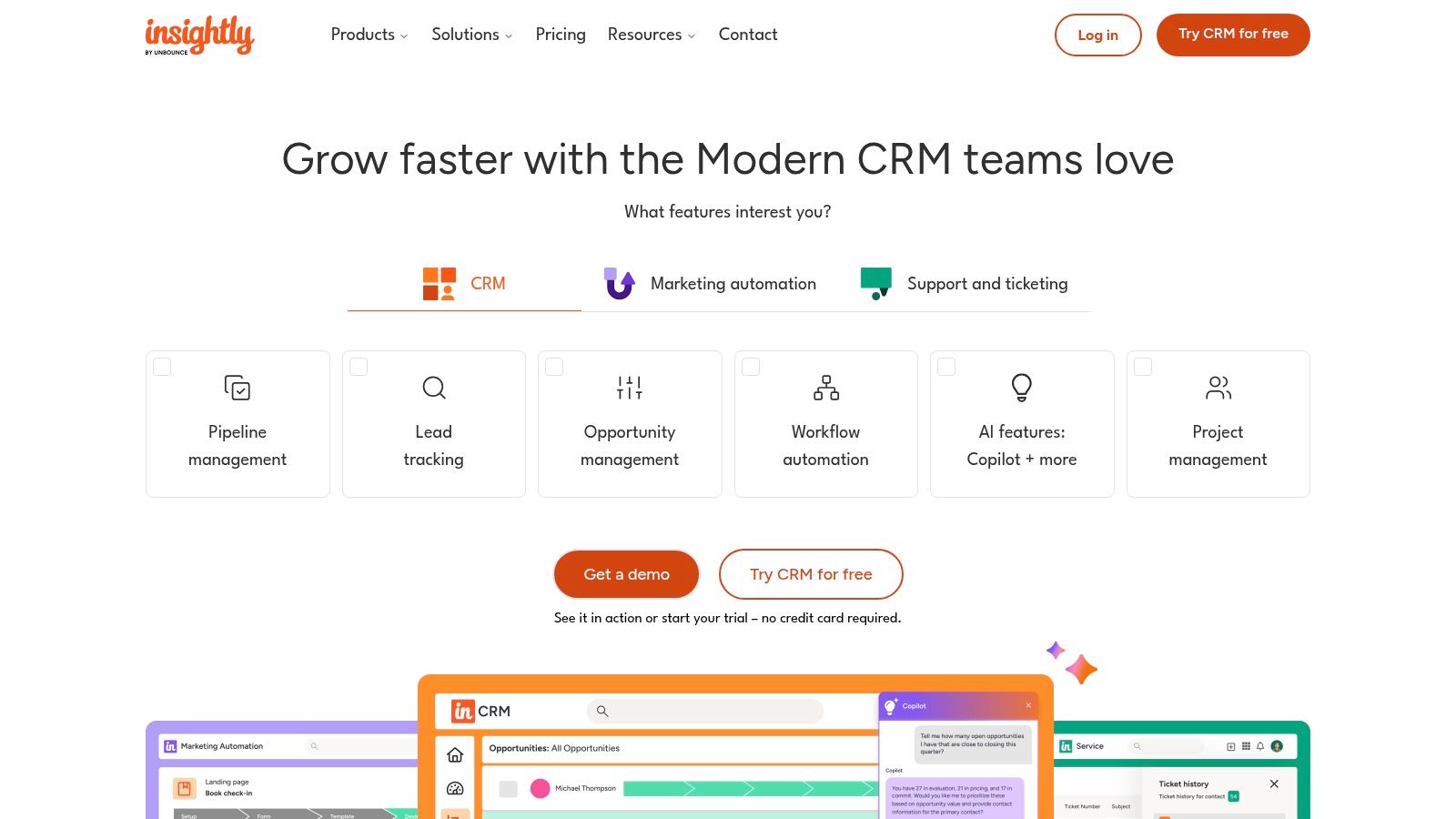
What makes Insightly stand out is this seamless link between sales and execution. Beyond its pipeline workflows and dashboards, its optional "All-in-One" bundles add marketing automation and customer service tools, creating a single source of truth for the entire customer lifecycle. This makes it ideal for service-based businesses that manage long-term client relationships.
Key Details & Pricing
| Aspect | Detail |
|---|---|
| Ideal For | Businesses needing integrated CRM and project management. |
| Pricing | CRM plans start at $29/user/month (billed annually). |
| Unique Feature | The ability to convert won deals directly into manageable projects. |
| Implementation | Some plans bundle mandatory onboarding and support fees. |
Pros:
- Excellent for teams that require post-sale project tracking.
- Solid customization options and robust API access via AppConnect.
- "All-in-One" plans consolidate sales, marketing, and service.
Cons:
- Pricing can be higher due to bundled onboarding/success fees.
- Cost can increase with fixed user allotments and additional fees.
Website: https://www.insightly.com/
11. Pipeline CRM
Pipeline CRM is purpose-built for small and mid-sized businesses (SMBs) seeking a straightforward and effective sales pipeline management software without a steep learning curve. It prioritizes simplicity and quick adoption, allowing teams to get up and running in minutes. The platform offers clean, visual pipelines that make it easy to track deals, manage contacts, and monitor sales velocity at a glance.
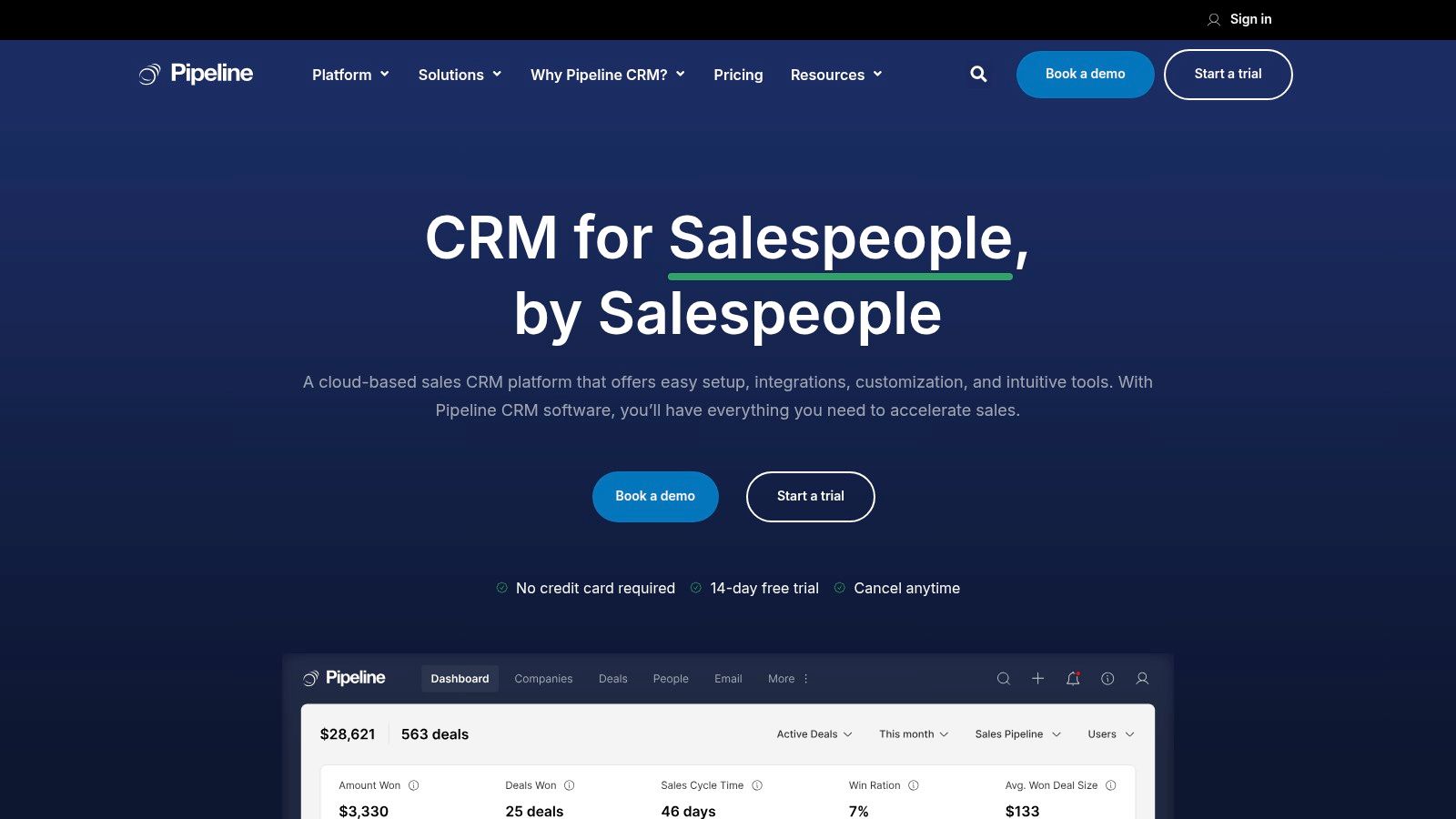
What makes Pipeline CRM stand out for its target audience is its focus on core sales activities and ease of use. It strips away the complexity found in enterprise-level CRMs, offering features like email drip campaigns and simple e-signing that directly support the sales process. This focus ensures that your B2B lead generation strategies are supported by a tool that sales reps will actually use.
Key Details & Pricing
| Aspect | Detail |
|---|---|
| Ideal For | SMBs and sales teams needing a simple, fast-to-implement CRM. |
| Pricing | Plans start at $25/user/month (billed annually) for the Start plan. |
| Unique Feature | A highly intuitive user interface combined with US-based customer support. |
| Implementation | Very fast setup, often completed the same day with free data migration. |
Pros:
- Extremely easy to learn and onboard new team members.
- Transparent pricing with a 14-day free trial and clear plan features.
- Excellent US-based customer support and free data migration assistance.
Cons:
- Limited third-party integrations compared to larger CRM ecosystems.
- Reporting capabilities are functional but less advanced than enterprise platforms.
Website: https://pipelinecrm.com/
12. Nutshell
Nutshell is a user-friendly CRM that offers surprisingly robust sales pipeline management software for small to medium-sized businesses. It focuses on simplicity and ease of use, allowing teams to set up customizable pipelines, automate sales sequences, and manage contacts without a steep learning curve. The platform is designed to get teams up and running quickly.
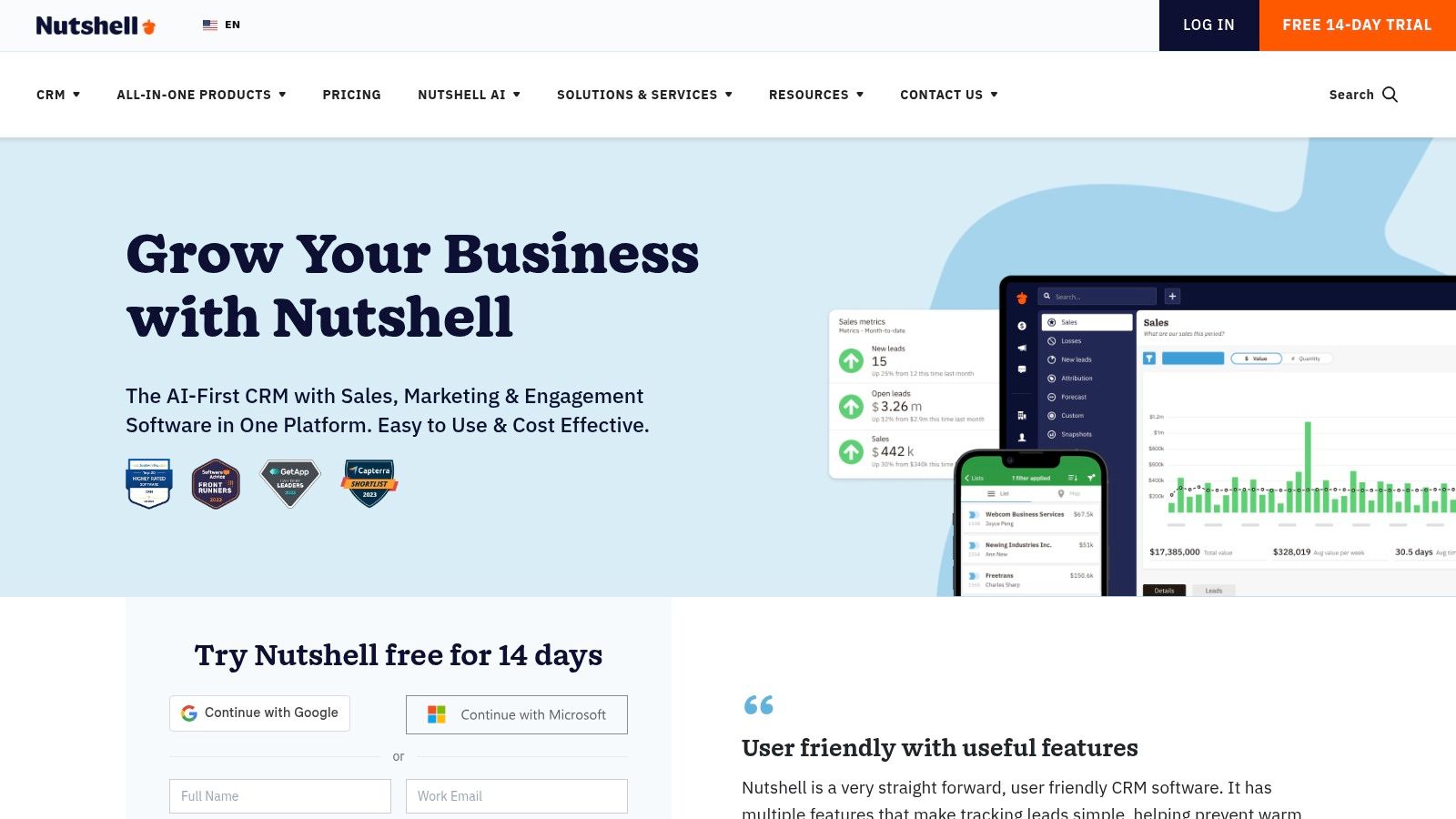
What makes Nutshell stand out is its commitment to transparent pricing and exceptional customer support. Unlike many competitors, it includes unlimited contacts on all plans and provides responsive, US-based support, making it a great choice for teams that value direct and helpful assistance without hidden costs.
Key Details & Pricing
| Aspect | Detail |
|---|---|
| Ideal For | Small to medium-sized businesses needing an easy-to-use yet powerful CRM. |
| Pricing | Plans start at $16/user/month (billed annually) with a 14-day free trial. |
| Unique Feature | Unlimited contacts on all plans and highly-rated US-based customer support. |
| Implementation | Quick and straightforward setup, designed for teams without a dedicated admin. |
Pros:
- Transparent, all-inclusive pricing with unlimited contacts.
- Intuitive interface that is easy for new teams to adopt.
- Responsive and knowledgeable US-based customer support.
Cons:
- Advanced features like unlimited pipelines and funnel reports require higher-tier plans.
- Fewer third-party integrations compared to larger enterprise platforms.
Website: https://www.nutshell.com/
Sales Pipeline Management Software Comparison
| Product | Core Features | User Experience | Value Proposition | Target Audience | Price & Plans |
|---|---|---|---|---|---|
| Salesforce Sales Cloud | Pipeline mgmt, AI forecasting | Scalable, customizable | Robust ecosystem, deep features | Complex teams, enterprises | Higher cost, admin expertise needed |
| HubSpot Sales Hub | Pipelines, sequences, 1500+ apps | Easy onboarding, free tier | Strong marketing integration | SMBs, scaling teams | Free tier; costs rise with scaling |
| Pipedrive | Kanban pipeline, email sync | Intuitive, fast setup | Transparent pricing, quick ROI | SMBs | Paid plans only, free trial available |
| Zoho CRM | Multi-pipelines, AI insights | Some learning curve | Cost-effective, customizable | SMBs | Competitive pricing, tiered features |
| Microsoft Dynamics 365 | Lead mgmt, MS365 integration | Enterprise-grade | Strong security, MS ecosystem | Enterprises invested in MS | Complex licensing, enterprise effort |
| monday sales CRM | Unlimited pipelines, automation | Highly customizable | Cross-team collaboration | Various business sizes | Tiered plans, advanced features locked |
| Freshsales | Multi-pipelines, AI scoring | Integrated communication | All-in-one CRM & communications | SMBs | Competitive pricing, trial available |
| Copper | Google Workspace native | Easy for Google users | Deep Gmail/Calendar integration | Google-heavy teams | Contact limits on lower tiers |
| Close | Calling, SMS, email integration | Streamlined for inside sales | Strong communication focus | High-velocity sales teams | Extra costs for telephony/SMS |
| Insightly | Pipeline + project mgmt | Good customization | All-in-One sales + service | Teams needing project tracking | Higher costs, onboarding fees |
| Pipeline CRM | Visual pipeline, drip campaigns | Simple onboarding | Easy setup, US-based support | SMBs | Clear pricing, trial available |
| Nutshell | Customizable pipelines, AI notes | User-friendly, US support | Transparent pricing, unlimited contacts | SMBs | Higher-tier analytics/features |
Final Thoughts
Navigating the crowded market of sales pipeline management software can feel overwhelming, but the right platform is a powerful catalyst for growth. As we've explored, the "best" tool isn't a one-size-fits-all solution; it's the one that aligns perfectly with your team's unique workflow, size, and strategic goals. From the enterprise-level power of Salesforce to the user-friendly, sales-focused design of Pipedrive, your ideal system is on this list.
The key takeaway is that effective pipeline management isn't just about tracking deals. It’s about creating a predictable, repeatable process that drives revenue. A well-chosen tool provides the structure and visibility needed to make that happen, turning gut feelings into data-driven decisions.
Choosing Your Ideal Sales Pipeline Management Software
Before you make a final decision, distill your needs down to the essentials. Don't get distracted by a long list of features you'll never use. Instead, focus on the core functionalities that will have the biggest impact on your daily operations and long-term success.
Here’s a simple framework to guide your selection process:
- For Startups and Small Teams: Prioritize ease of use, quick setup, and affordability. Tools like Pipedrive, Close, and Nutshell offer fantastic value without a steep learning curve, letting you focus on selling.
- For Growing Mid-Sized Businesses: Look for scalability, marketing automation integrations, and robust reporting. HubSpot Sales Hub and Freshsales provide a great balance of power and usability to support an expanding team.
- For Large Enterprises and Complex Sales: Your needs will revolve around deep customization, advanced security, and integration with a wide technology stack. Salesforce Sales Cloud and Microsoft Dynamics 365 Sales are built to handle this level of complexity.
- For Teams Deep in the Google Workspace Ecosystem: If your team lives in Gmail and Google Calendar, Copper offers an unparalleled native integration that minimizes friction and boosts adoption.
Your Actionable Next Steps
Information is only valuable when you act on it. Use the insights from this guide to move forward with confidence.
- Shortlist Your Top 3: Based on the profiles above, select three platforms that seem like the best fit.
- Sign Up for Free Trials: Nearly every provider offers a free trial or demo. Use this opportunity to get a hands-on feel for the user interface, test key features, and see how it fits your team’s workflow.
- Involve Your Team: Get feedback from the salespeople who will be using the tool every day. Their buy-in is critical for successful implementation and long-term adoption.
Ultimately, investing in the right sales pipeline management software is an investment in your team's potential. It empowers them to be more organized, efficient, and strategic. By choosing wisely, you’re not just buying a tool; you’re building the foundation for a more predictable and profitable sales future.

